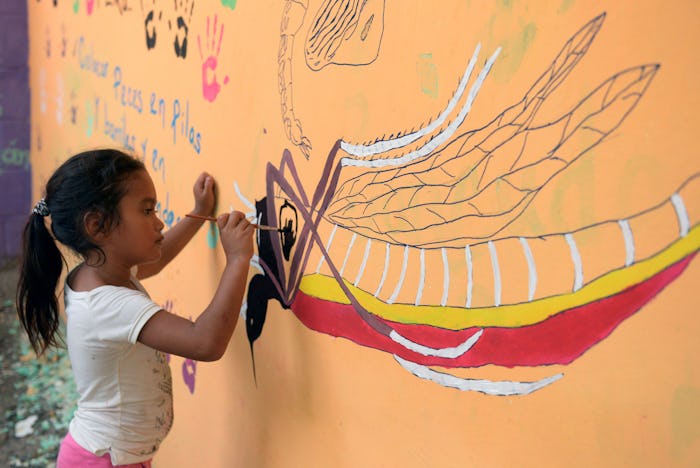
What To Do If You Think Your Toddler Has Zika, Because Mosquito Season Is Here
It's been over a year since the World Health Organization first identified a new outbreak of the Zika virus in Brazil. Since then, both the WHO and the Centers for Disease Control and Prevention have issued numerous travel warnings and public health advisories about the largely mosquito-borne virus. The warnings have been heavily targeted toward pregnant women or women who are considering getting pregnant, as the Zika virus can cause devastating birth defects in utero such as microcephaly. But what about those who aren't pregnant — but are still just as vulnerable, such as young children? Here's what to do if you think your toddler has Zika.
While the Zika virus can have devastating effects on a developing fetus, the Zika infection itself for both adults and children is fairly mild. Signs and symptoms of Zika viral infection include a fever, rash, red eyes, and joint pain, typically lasting for a week. Headache and muscle aches are also symptoms — aside from the rash, a Zika infection presents with symptoms similar to the flu. There are also plenty of people who will contract the Zika virus and not show symptoms, either. It's both these similarities to other common illnesses combined with asymptomatic presentations that make both recognizing the signs and diagnosis of a Zika infection in children so challenging.
However, despite the usually mild symptoms that Zika presents, there can be complications that can occur after contracting the virus, such as the development of Guillan-Barre syndrome. While the link between Zika and Guillain-Barre is still being investigated, the syndrome can cause autoimmune neurological damage that can leave a person paralyzed.
With the possibility of such a complication, it's important that your toddler seek medical attention if he or she has been to a location where Zika can be transmitted and is showing flu-like symptoms with a rash. Barring any severe, life-threatening symptoms that require a trip to the emergency room, an urgent appointment with your pediatrician would make more sense. Your pediatrician will most likely recommend supportive care if your toddler has Zika: rest, fluids, and possibly non-steroidal anti-inflammatory drugs (NSAIDS) to manage fever and discomfort.
There is currently no vaccine to prevent the transmission of Zika, so the best way to approach the Zika virus is by taking preventative measures to limit your child's exposure to the Aedes mosquito. There are plenty of insect repellants with DEET that are safe for your child, and they should be applied regularly when your child plays outdoors, especially during dusk hours when mosquitos are most active. Children should wear shirts with long sleeves and pants and socks, too. Obviously, the less you expose your child to Zika disease vectors, the less likely they are to contract it. So if you're thinking of taking a family vacation this summer to any Zika-affected regions (even in the U.S.), you might want to rethink your plans.
In the midst of all the horrible news about Zika, there are two important glimpses of hope for parents of young children. First, contracting Zika rarely results in death. To date, there has been only one Zika-related death in the U.S.: A man from Puerto Rico in his 70s died from complications associated with the virus in February. Second, children might be less likely to contract Zika, but researchers don't yet fully understand why that is. The average age of patients with Zika is 42 years old. Speaking to NBC News, UCLA professor of pediatrics Dr. Karin Nielsen said, "We were screening for it and going out and even going out and looking for it, and we did not find any children with Zika infection."
When in doubt about your toddler and Zika — as with any childhood illness — head to your pediatrician.